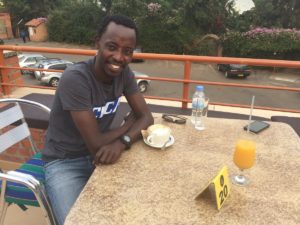 John Gasangwa was born and spent his early childhood in a refugee camp nestled in the country of Uganda. Before his birth, his family had been kicked out of their home country of Rwanda, and forced to take refuge in a foreign land. Throughout his time in this refugee camp, Gasangwa witnessed rape, murder, and even the starvation of two of his sisters. At the age of 13, he traveled to Rwanda to learn that his father had been killed in the Genocide of 1994. The rest of his upbringing would be within the walls of one of the many Rwandan orphanages. Against all odds, he completed not only his secondary education, but earned a college degree as well. After graduation, Gasangwa began work for mission-oriented organizations like World Vision, Opportunity International, and KIVA.
John Gasangwa was born and spent his early childhood in a refugee camp nestled in the country of Uganda. Before his birth, his family had been kicked out of their home country of Rwanda, and forced to take refuge in a foreign land. Throughout his time in this refugee camp, Gasangwa witnessed rape, murder, and even the starvation of two of his sisters. At the age of 13, he traveled to Rwanda to learn that his father had been killed in the Genocide of 1994. The rest of his upbringing would be within the walls of one of the many Rwandan orphanages. Against all odds, he completed not only his secondary education, but earned a college degree as well. After graduation, Gasangwa began work for mission-oriented organizations like World Vision, Opportunity International, and KIVA.
In his time with these ministries, he learned a new way to combat poverty. Eventually, in 2011, this experience coupled with a MBA in Global Social Sustainable Enterprise, enabled him to found a ministry of his own. Thus Arise Rwanda Ministries was born in Boneza, Rwanda. It’s modeled after the cliche, “give a man a fish, and you’ll feed him for a day, but teach a man to fish, and you’ll feed him for a lifetime”. In his own words, Gasangwa says they’re providing “trade not aid”. The ministry focuses on three main programs: education, clean water, and community development. These three threads of ministry, weave together to break the poverty cycle and foster a strong, self-sufficient economy. In providing education, Arise Rwanda Ministries allows children the opportunity for employment in more than just subsistence farming. Microfinancing local entrepreneurs and training the youth in profitable trades empowers community members to provide for themselves and no longer rely on aid. Even digging wells for clean water has an economic impact, creating jobs in well maintenance and providing much-needed clean water for local business endeavors. Together, these three unique but united goals have transformed the community they service. The Boneza of today is drastically different than before, and the whole community has benefited. Kivu Hills Academy (est. 2015) provides education beyond the eighth-grade level for the first time in the community. Coffee shops, basket weaving and sewing co-ops, and other endeavors provide jobs and in turn additional income for households that desperately need it. Many of these products are even being sold in US markets. Kivu Hills Coffee, grown in the Boneza Community, is exported to Schuil Coffee Co. in Grand Rapids, Michigan, where it is roasted, packaged, and sold. The Amahoro sewing co-op exports its handcrafted bags to North-East Ohio where high school business students market and sell them under the name Shya Designs. Instead of just giving his fellow Rwandans a fish, so to speak, John Gasangwa has helped teach them to fish, empowering them to help rebuild their country. More information on how to get involved with Gasangwa and his vision can be found at this link.

This is an inspiring story of how resilient people and of how people respond to difficulties. Gasangwa’s childhood was filled with pain but he did not let that pain defeat. He was driven enough to get a college degree and actually make a change in a place where it seemed like there was no hope. Gasangwa is such an inspiring entrepreneur because he saw a problem, and even though it is a big problem he is determined to make a change.
At the very center of your being you have the answers; you comprehend your divinity and you comprehend what you needed.